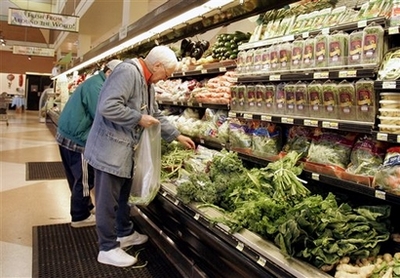US economy grows by only 0.6% in 1st quarter
(Agencies)
Updated: 2008-04-30 22:29
Updated: 2008-04-30 22:29
WASHINGTON - The bruised economy limped through the first quarter of this year at only 0.6 percent as housing and credit problems forced people and businesses alike to hunker down.
 Customers shop at a supermarket in Chicago Tuesday, April 29, 2008. [Agencies] |
The country's economic growth during January through March was the same as in the final three months of last year, the Commerce Department reported Wednesday. The statistic did not meet what economists consider the classic definition of a recession, which is a retraction of the economy. This means that although the economy is stuck in a rut, it is still managing to grow, even if modestly.
Many analysts were predicting that the gross domestic product (GDP) would weaken a bit more - to a pace of just 0.5 percent - in the first quarter. Earlier this year, some economists thought the economy would actually lurch into reverse during the opening quarter. Now, they say they believe that will likely happen during the current April-to-June period.
Gross domestic product measures the value of all goods and services produced within the United States and is the best measure of the country's economic health. Voters are keenly worried about the country's economic problems and so are politicians - in Congress, in the White House and on the campaign trail.
The housing situation turned more bleak in the first quarter, as record-high foreclosures dumped more unsold homes on the market, adding to builders' headaches. Builders slashed spending on housing projects by a whopping 26.7 percent, on an annualized basis, the most in 27 years. That was the big drag on the economy.
Consumers - whose spending is vital to the country's economic health - turned much more cautious, also restraining overall economic growth in the first quarter. Their spending rose at just a 1 percent pace. That was down from a 2.3 percent growth rate and was the slowest since the second quarter of 2001, when the United States was suffering through its last recession.
Soaring energy and food prices are walloping people's pocketbooks, leaving them with less to spend on other things. The credit crunch also has made it harder for people to finance big ticket items, such as cars and homes. And, many homeowners - watching their homes - often their single-biggest asset - slump in value, also are feeling less wealthy and less inclined to spend.
|
||
|
||
|
|
|
|

